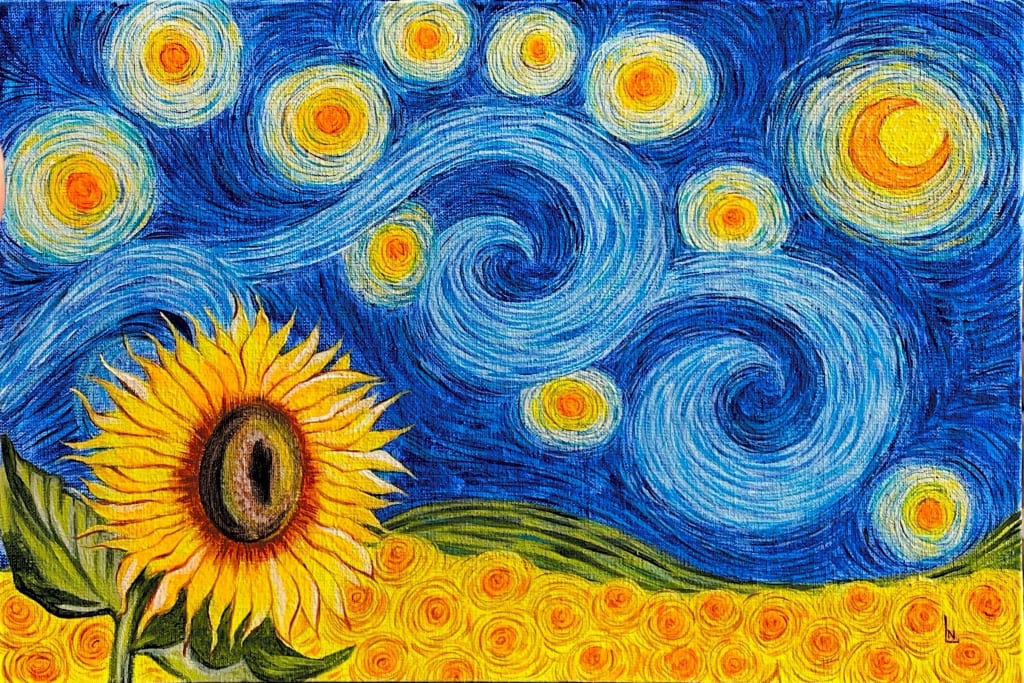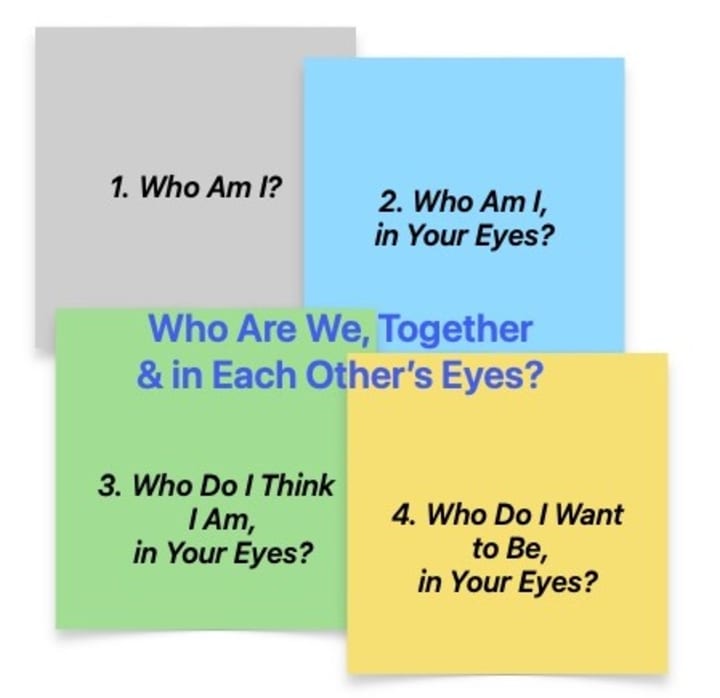Identity and Communication
Who are we, people? How to be better humans.

We all go through life wondering who we really are and who we want to be when we grow up. Identity -- the idea and image of self that makes us both distinct from and similar to other people -- is something that we become acutely aware of in teenage years and carry with us all our life. Some of it is the unshakable baggage we are saddled with at birth, but much of it is being shaped by experiences, interactions, and communication with other people, by life itself.
We communicate our identity to others in many different ways: by who we visibly are, how we carry ourselves in public and command the space around us, what we wear and how we move, as well as what we carry in our heads and hearts in terms of experiences and outlook on life. Our background, knowledge, experience and expertise contribute to our identity and make us both unique and alike in relation to others.
Identity can be conceptualized and communicated in four different ways:
1) Who you really are at the core. This is the most fascinating aspect of identity as none of us truly knows who we are. We are big black boxes to ourselves, and looking into that black box and understanding it is a fascinating exercise. Our true self shaped by the cumulative of all our experiences and personality traits, and we can only understand it by deep self-reflection and comparing our present characteristics and virtues to who we were in the past and who we want to be in the future.
Some of our core characteristics are more permanent than others: We cannot escape the culture, ethnic group, race, families and most of the times the sex/gender we are born into. We wear such characteristics on our sleeves or display them in overt behavior and cultural artifacts such as (traditional) clothing, tattoos or jewelry. Just by looking at me, for example, an observer can figure out that I am a middle-aged middle class white woman. Those are my characteristics that are easily identifiable and verifiable. If the observers start talking with me, they would probably be able to figure out that I am highly educated (sometimes I joke that I am certifiably smart as I have earned a doctor of phylosophy diploma) and that I have a discernible Slavic accent. In one of the earlier conversations of our budding friendship it might come up that I have a college-aged son and that I am a college professor. I might also share that I grew up in the Soviet Union and was raised as an older of two daughters by a single mother. Those are experiences and characteristics that shaped my identity, who I really am. Even though some of them may change as I progress in life (age, for one, or professional position), most of them will stay largely unchangeable at the core.
Some of our core characteristics are more obvious to other people than to ourselves. For example, I may consider myself to be kind and loving but if someone observes me in my no-nonsense straight "tough love" talk with my son they might think that I am strict and demanding. One of the biggest revelations in my life, for example, was years ago when one of my dear friends made an observation that I may have become a strong and self-reliant woman because I was raised by a single mother and had a good role model showing that women can do it all on their own if they have support networks of family and friends. I am incredibly grateful to that friend for mending my self-worth holed by an absent father. So it is important to do a perception check of who we are with other people, especially those who can be honest with us and care for our well-being and growth.
2) Who you are in other people's eyes. This is about perceptions, understanding and images of who we are held by other people. To many of us the fact that others may see us differently and ascribe to us intentions and behaviors that we did not mean can come as a revelation. We need to remember that we all see the world and other people in it in unique and different ways (perspectives) and to some people we can come across more negative than we intend to be. Again, perception checks through communication are important in these cases and none of us should be shocked by the fact that other people may see and evaluate us differently.

3) Who I think I am in your eyes. This is about your perception of other people's perceptions, so there's an additional layer of complexity to it, sort of like a mirror reflected in another mirror with distortions. It may come to light when you suddenly realize that others see you differently or when you observe an unexpected reaction to your verbal or non-verbal behavior. Keen observation skills and ability to take perspectives and see yourself through other people's eyes will help you manage and communicate this aspect of your identity. Again, perception check and respectful response to comments, no matter how unfair or hurtful they may seem to you (remember, everyone has the right to see people and things the way they understand and interpret them), and honest communication about mistakes and intentions are the key to your growth in this area.
4) Who I want to be in your eyes. This is basically about reputation and image management. Barring purposefully mean and immature people, most of us want to look good in other people's eyes. For this, we try to be friendly and helpful as our reputation consists of those instances of our behavior when we were nice to others. We should understand, however, that we cannot be universally liked or loved by everyone. Years ago, I discovered for myself that as a college professor, no matter how hard I try to be kind, helpful, and fair, there will be always some students who will not like me for whatever reason. When it comes to student evaluations of my teaching, I am content in the knowledge that my negative evaluations never exceeded one-fourth of the total. And I always try to find a way to improve my teaching based on even the most negative evaluations by trying to take the student's perspective. It breaks my heart to see how many people are trying to please everyone around them, wasting their time, effort, and mental energy. To me, it is also a sign of immaturity. As long as you are authentic, mean well, and genuinely try to help others, your reputation will be good and the negative people's feedback will be compensated by good memories and experiences of you from other people, especially from people who matter to you.
Ultimately, as social animals and members of various groups, our identity coalesces into the question in the middle of my chart above: Who are we together and in each other's eyes? We derive our identity from other people and our relationships with them. In my earlier example, it is much more important for me to be a good, nurturing mother in my son's eyes rather than in the eyes of someone who accidentally witnessed my "stern" interaction with him. The bond that I created with my son through love, and open and honest communication is something that gives us both strength and grounds us in life.
As a point of reflection, you can take any other relationship that is important for you and analyze it by running it through the five questions above. You'd be surprised how much you will learn about yourself and others from this exercise, which can become a part of your deep self-reflection.
Here is a fun starter question: Ask yourself, are you an introvert or extrovert, or somewhere in between? Answer the question honestly, based on your own idea of yourself and your behaviors and experiences with others. Then use a diagnostic tool to see how your self-concept is different from what psychology tells us about that communicative aspect of our personality. Here's a fun and easy one, but you can also do a full-blown self-diagnosis on 16 personality types; there's a lot of diagnostic websites, both free and paid, for that. Finally, ask people who know you best and matter in your life - parents, siblings, significant others, friends - if they think you are an extrovert or introvert and why. If there are too many discrepancies, identify the aspect of communicative identity that you can work on to match your true identity and its perception by others. You can do that with other personality traits as well: are you reliable? kind? helpful? etc. and work on them to grow and become better as a human being. Also, remember that our identities are fluid and changing: you can be more of an extravert when you are young and become introverted as you progress through life, or vice versa. Doing the identity or personality diagnosis every 3-5 years can also be useful and self-reflective. And in the end, you can write a memoir about it that at least some people who care about you will read and enjoy.
About the Creator
Lana V Lynx
Avid reader and occasional writer of satire and short fiction. For my own sanity and security, I write under a pen name. My books: Moscow Calling - 2017 and President & Psychiatrist
Enjoyed the story? Support the Creator.
Subscribe for free to receive all their stories in your feed. You could also pledge your support or give them a one-off tip, letting them know you appreciate their work.






Comments (1)
Dear Professor Lynx ~ As a retired Hugely-Scrutinized Legal Biz Writer.*I've subscribed to you with pleasure. Your 'Stary-Stary Nights' gives us all much to 'reflect' upon along with your carefully worded presentations that are just marvelous. I'm currently scrolling through your offerings. I've morphed into a non-fiction old fashion "Goof Writer' - not into contests - nothing more. Wish we had a 'Senior' category ~ Lots of lonely former note passers would interact with 'favorite' memories of their own; with vigor ~ - Perception Trumps Reality every Single Time - ~ With Respect ~ Jay Kantor, Chatsworth, California 'Senior' Vocal Author - Vocal Author Community -